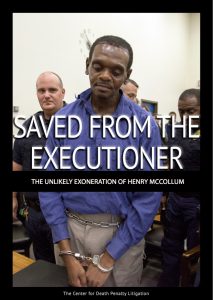For Immediate Release: March 2, 2018
For More Information Contact: ACLU Capital Punishment Project E.D. Cassandra Stubbs, 919-449-4885
Raleigh, NC – Today, the N.C. Supreme Court agreed to hear cases that will decide whether four defendants of color should remain on death row despite documented evidence of racial bias in their cases. The court accepted the cases of Marcus Robinson, Quintel Augustine, Tilmon Golphin and Christina Walters – who were the first people to prove under the N.C. Racial Justice Act that racial discrimination helped secure their death sentences.
The justices will now receive briefs and hear oral arguments from both sides. Lawyers for the four said the Supreme Court’s decision to grant review is an important step in a landmark civil rights case.
“I’ve had the honor of being involved in a number of civil rights milestones in North Carolina,” said attorney James Ferguson, a founding member, along with the late Julius Chambers, of the prominent law firm Ferguson, Chambers & Sumter. “In the 1960s, I was part of our state’s first racially-integrated law firm. We challenged school segregation and housing and employment discrimination, winning several cases in the U.S. Supreme Court. I was there in 2013 when the governor pardoned the Wilmington 10, a group of civil rights activists who were wrongly convicted in the 1970s by a racially biased prosecution. These Racial Justice Act cases are every bit as important to our state’s progress on civil rights issues.”
In 2012, after listening to weeks of testimony and sorting through documents that spanned decades, Superior Court Judge Gregory Weeks found “a wealth of evidence showing the persistent, pervasive, and distorting role of race in jury selection throughout North Carolina.” Weeks said the defendants proved that prosecutors removed African Americans from jury service at double the rate they struck other potential jurors. The defendants also exposed bias in prosecutors’ own notes, training materials and testimony. For example, a Cumberland County prosecutor wrote notes such as “blk wino,” “thug,” and “black, high drug” to describe prospective jurors in a capital case.
Under the Racial Justice Act, Weeks removed all four prisoners from death row and sentenced them to life without parole. However, in 2015, the N.C. Supreme Court overturned Weeks’ decision, saying the hearings should be done over because the state wasn’t given enough time to prepare and that three of the defendants, who were tried together, should have their own separate hearings. The defendants were sent back to death row.
Then, in January 2017, Superior Court Judge Erwin Spainhour threw out all four cases without allowing a second hearing, saying the defendants could no longer use the Racial Justice Act because the legislature repealed it in 2013. Now, the Supreme Court will decide whether Judge Spainhour’s decision to dismiss the defendants’ powerful evidence of race discrimination was correct.
These four defendants join two other death row prisoners, Rayford Burke and Andrew Ramseur, who are already on the court’s docket with a related claim. In those cases, the court will decide whether death row prisoners who filed Racial Justice Act claims but have not yet had hearings still have the right to present evidence of racial bias in court.
“All we want is for the courts to look at the facts and make a fair decision,” said Ferguson. “When you really look at the evidence, it’s clear that race is influencing how we use the death penalty in North Carolina. This is a chance for the state’s highest court to declare, definitively, that racial bias in the death penalty is an urgent civil rights issue that cannot be swept under the rug.”

